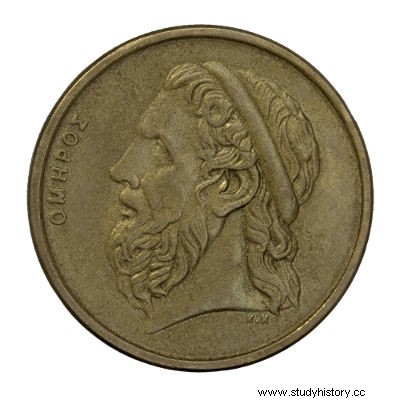
By Me. Cláudio Fernandes
Ancient Greece was also known by the name of Hélades , that is, the set of city-states that developed between the 8th and 5th centuries BC, on the shores of the Aegean Sea, in regions such as Attica, the Peloponnese Peninsula and Anatolia (today the extreme west of Turkey). Each polis – city – had autonomy in the processes of political, socioeconomic and cultural organization, including the form of education of citizens. However, one factor permeated the structure of education in all these city-states:the epic poetry of Homer.
To this day, specialists in history and ancient literature still speculate about the existence of the poet Homer, who has some traits of a mythical character - he was a blind poet who would have compiled and given order to a wellspring of oral narratives of the so-called “Period Pre-Homeric” . Despite being a real person or a character created by other poets, the fact is that the long poems Iliad (which deals with the war between the Greeks and Trojans”) and Odyssey (which narrates the return home of one of the Greek heroes who fought in Troy, Odysseus), attributed to Homer, were fundamental for the formation of the Greek man.
Both Athenians and Thebans or Spartans had a form of aristocratic education , that is, people were educated from the model of the heroes of Homeric narratives, to imitate from them the virtues that would make man the best possible. Among these virtues were courage, prudence and cunning. In addition, the Homeric narratives, read in groups, provided young students with a great ability to understand the classical Greek language, as well as the rhythm of the verses, which facilitated communication in all activities, such as politics, war, etc.
One of the leading scholars of ancient culture, Werner Jaeger , makes clear in his work Paideia – the education of the Greek man , the centrality that Homeric poetry had in Hellenic education, pointing out its influence on great figures of the Classical Period, such as Plato and Pindar :
The development of the spiritual forms of Homeric education of the nobility, through Pindar and up to Plato's philosophy, is absolutely organic, permanent and necessary. It is not an 'evolution' in the semi-naturalistic sense that historical investigation usually employs, but an essential development of an original form of the Greek spirit, which, in its fundamental structure, remains identical to itself through all the phases of its history. in> . [1]
There was a symbiosis between pedagogical, ethical and aesthetic instances in Greek education. Studies of Homer's epic poems had the function of introducing this mutual relationship in those who came into contact with them. Continues Jaeger:
[…] Homer's educational importance is evidently wider. It is not limited to the express formulation of pedagogical problems or to some passages that aspire to produce a certain moral effect. Homeric poetry is a vast and complex work of the spirit, which cannot be reduced to a single formula. Alongside relatively recent fragments that reveal an express pedagogical interest, there are other passages in which the interest in the objects described removes the possibility of thinking about a second moral intention of the poet. [2]
Of course, from city to city, many pedagogical aspects differed (such as the denial of complete educational training to women, in the case of Athens, and your permission, in the case of Sparta). However, Homer's influence was notable in all of them.
NOTES
[1] JAEGER, Werner. Paideia:the formation of the Greek man . São Paulo:Martins Fontes, 1995. p. 60.
[2] Idem. P. 66.
Take the opportunity to check out our video lessons related to the subject:
